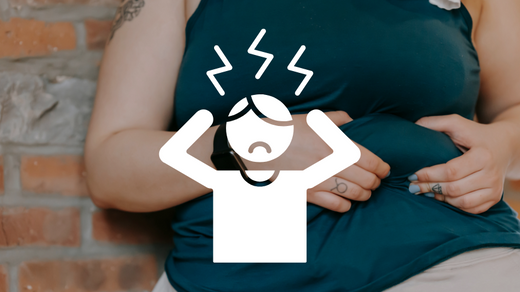Door psycho emotionele stress geven de hersenen een signaal naar de bijnier om cortisol te produceren, zodat het lichaam beter op stress kan anticiperen. Als dit te lang duurt, spreken we over chronisch stress en is er dus een lange afgifte van cortisol. Dit verhoogt langdurig de bloedsuikerspiegel, waardoor er verstoringen ontstaan in de energie- en insulinehuishouding. Daarom is stress op de lange termijn schadelijk en draagt het bij aan het ontwikkelen van het metabool systeem.
Onze hersenen bepalen veel van ons gedrag maar niet alles. Als er te veel vetweefsel ontstaat, dan kan dit de hersenen gaan beïnvloeden de energieverdeling over het lichaam te wijzigen.
Het brein wil namelijk net als in de oertijd nog steeds de energieopslag in vetweefsel in stand houden, voor tijden van eventuele schaarste. Er was simpelweg niet altijd voedsel, dus als het er was werd er veel van gegeten. Een teveel aan energie werd dan opgeslagen in onderhuids vetweefsel. Wanneer er niet genoeg voedsel was, kon het lichaam deze vetten afbreken en zette de lever dit om in glucose als energiebron voor alle organen, waaronder de hersenen en alle cellen. De omstandigheden bepalen de energieverdeling in het lichaam, zodat we flexibel op eventuele bedreigingen als honger, dorst, hitte, kou, verwonding etc. kunnen reageren. Dit systeem is nog steeds hetzelfde. Wij zijn heel gevoelig voor schaarste, ons brein reageert daarop door energie te sparen. Alle processen komen als het ware op een laag pitje te staan waardoor je met weinig energie kunt overleven. Omdat dit nu niet meer nodig is (denk aan de supermarkt en een goedgevulde koelkast, dus altijd eten voorradig) slaat het lichaam de overtollige energie op terwijl dit eerder voor klachten zorgt dan dat het baat heeft.
Beweging
Ook bewegen we super weinig ten opzichte van onze verre voorouders. Nederland is de nummer 2 van heel Europa wat betreft de uren zittijd per dag, gemiddeld 8-9 uur per dag. Onder tieners is dit zelfs 12 uur per dag. De ‘sedentary lifestyle’ is waarschijnlijk de grootste risicofactor voor overgewicht.
Van nature willen we geen energie verspillen als er genoeg voorradig is in het lichaam. Kijk in de natuur ook eens naar leeuwen, die komen alleen in actie voor het zoeken naar een prooi, het jagen zelf en voor voortplanting.
De hersenen reageren op honger- en verzadigingshormonen die vanuit het lichaam gestuurd worden via het bloed.
Leptine en ghreline
De laatste tien jaar is het duidelijk geworden dat vetweefsel niet zomaar een opslagplaats van vet is zoals vroeger werd gedacht. Het vetweefsel scheidt talloze hormonen af (adipokines) die een belangrijke rol spelen in het vet- en koolhydraatmetabolisme en de biologie van vaatcomplicaties. Het is dus een complex endocrien orgaan. Via het bloed zorgen de hormonen van het vetweefsel ervoor dat andere organen in het lichaam harder of juist minder hard gaan werken. De vetcellen hebben dus veel effect op andere weefsels en zo ook op de hersenen.
Eén van de hormonen afgegeven door de adipocyten (vetcellen) is leptine. Dit hormoon zorgt ervoor dat je hersenen, in de hypothalamus, het signaal krijgen dat er genoeg gegeten is. Het reguleert verder je energieniveau en hoeveel lichaamsvet er verbrand mag worden. Al onze organen hebben receptoren voor leptine. De hersenen, het immuunsysteem en de voortplantingsorganen zijn het meest gevoelig voor deze stof.
Als leptine hoog genoeg is afgegeven aan het bloed en in het brein aankomt, stopt een ander signaalstofje ghreline, welke juist doorgeeft dat je wil gaan eten. Ghreline wordt ook aangemaakt door de hypothalamus en zet de hypofyse (een hormoonklier in het brein) aan om groeihormoon af te scheiden. Ghreline speelt ook een rol in de hippocampus, waar het de leervaardigheid stimuleert en ook de aanpassing aan veranderde omstandigheden. Het stimuleert verder de vetsynthese en vermindert de vetafbraak. Slaapgebrek kan zelfs leiden tot overgewicht door een toename van ghreline.
Dus in een gezonde situatie geeft (een lege) maag ghreline af, wat via het bloed de hersenen bereikt. Hierdoor krijg je trek. Zodra je dan gegeten hebt, zorgt leptine er dan na een tijdje weer voor dat je hongersignaal stopt omdat er weer genoeg energie binnengekomen is, totdat je deze energie weer verbruikt hebt (door het basaalmetabolisme en daarnaast je inspanningen). Dan herhaalt dit patroon zich. Maar wanneer je door bijvoorbeeld stress urenlang ligt te piekeren 's nachts, kan dit slaapgebrek dus leiden tot een toename van ghreline, wat uiteindelijk zelfs tot overgewicht kan leiden.








